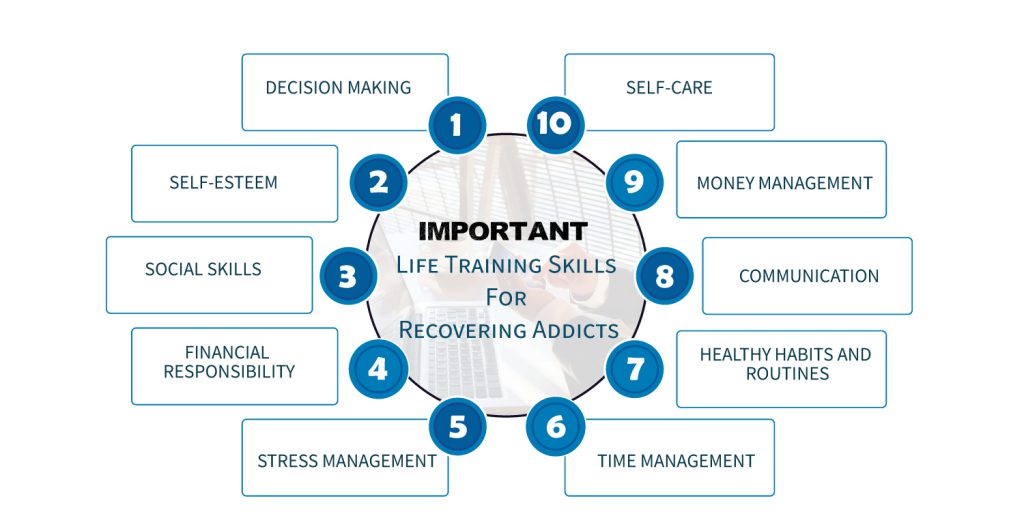If you are an addict or know someone who is, learning life training skills is crucial to your success. Addicts often struggle in areas such as self-care, money management, and communication.
Thankfully, many resources and mentoring programs are available to help you learn the necessary skills. This blog post will outline some of the most crucial life skills for addicts to learn.
Keep reading for more information!
What Are Life Training Skills?
Life skills are the tools a person needs to navigate the challenges of everyday life. While some may think these skills come naturally, this is seldom the reality. Instead, these life skills can be built through education and practice.
For addicts in recovery, life skills training is often a key component of their treatment plan. This is because recovering from drug abuse can be a daunting task, made even more difficult because addicts often lack basic life skills.
Without these skills, it can easily fall back into old behavior patterns of drug and alcohol use. Learning life skills can help addicts to build a foundation for long-term recovery.
Important Life Training Skills For Recovering Addicts
Some of the essential life skills for addicts to learn during addiction treatment include:

Self-care
Addicts often neglect their own physical and emotional needs. Learning how to take care of yourself is crucial to your success in recovery. This includes eating a balanced diet, getting enough exercise, and having regular medical and dental checkups.
Money Management
Many addicts struggle with money management skills. This can include budgeting, paying bills on time, and saving money. Learning how to manage your finances can help you avoid financial stress and difficulty in recovery.
Communication
Effective communication is vital in all aspects of life. Addicts often have difficulty communicating their needs and feelings. Learning to express yourself clearly can help you build healthier relationships and avoid conflict.
Healthy Habits and Routines
Addicts often need to develop healthy habits and routines to recover. This can include a regular sleep schedule, eating breakfast every morning, and avoiding trigger foods and situations. Having a daily routine can help you stay on track in recovery.
Time Management
Learning how to manage your time can be helpful in recovery. This includes setting goals, prioritizing tasks, and avoiding procrastination. Time management skills can help you stay organized and on track in recovery.
Stress Management
Addicts often struggle with managing stress. This can include learning to relax, set boundaries, and cope with difficult emotions. Stress management skills can help you reduce stress and improve your overall well-being in recovery.
Self-esteem
Many addicts struggle with low self-esteem. This can be due to negative thoughts and feelings about yourself, your past, and your addiction. Learning how to build self-esteem can help you feel better about yourself and improve your self-confidence in recovery.
Social Skills
Social skills are important in all aspects of life. Addicts often have difficulty interacting with others. Learning how to make conversation, be assertive, and handle conflict can help you build healthier relationships in recovery.
Financial Responsibility
Addicts often struggle with financial responsibility. This can include budgeting, paying bills on time, and saving money. Learning how to manage your finances can help you avoid financial stress and difficulty in recovery.
Decision Making
Many addicts have difficulty making decisions. This can be due to impulsive behavior, poor judgment, and a lack of forethought. Learning to make responsible decisions can help you avoid making mistakes in recovery.
Problem Solving
Problem-solving skills are important in all walks of life. Addicts often have difficulty identifying and solving problems. Identifying and addressing issues can help you manage stress and avoid conflict in recovery.
Goal Setting
Goal setting is important in all aspects of life. Addicts often have difficulty setting and achieving goals. Setting realistic and achievable goals can help you stay on track in recovery.
Coping Skills
Positive coping skills are important for dealing with difficult emotions. Addicts often struggle with managing their emotions. Learning how to deal with stress, anxiety and depression can help you feel better in the recovery process.
Why Are Life Training Skills Important for Recovery?
- Goal setting is essential in all aspects of life. Addicts often have difficulty setting and achieving goals. Life skills will give them enough confidence to think of a better future and set goals.
- Healthy coping skills can help in dealing with difficult emotions.
- Life skills can solve many problems in an addict’s life, such as job loss, financial instability, and relationship difficulties.
- Life training skills can help addicts learn how to manage their finances, communicate effectively, and stay healthy.
- These skills can help addicts stay on track in recovery, improve their overall well-being and get rid of mental illness.
- Life training skills are important for all aspects of life, not just recovery. Learning these skills can help addicts build a foundation for success in all areas of their lives.
- Learning how to relax can help you reduce stress.
- Developing healthy habits and routines can help you stay on track in recovery.
- Learning how to make conversation, be assertive, and handle conflict can help you build healthier relationships in recovery.
- Addicts often have difficulty identifying and solving problems. Life training skills can help them in this regard.
Life skills training is vital for recovery because it can help addicts learn how to live a healthy and successful life in sobriety. Many addicts struggle with basic life skills such as money management, communication, and time management. Learning these skills can help addicts avoid stress and difficulty in recovery.
Benefits of Life Training Skills?
Some benefits of life training skills include:
- Improved self-esteem
- Get rid of unhealthy coping skills
- Prevent Negative feelings
- Prevent relapse
- Better communication skills
- Positive changes in negative behavior
- Decrease in relapse triggers
- Improved decision-making skills
- Improved stress management skills
- Increased confidence
- Improved relationships
These are just a few examples of how life-training skills can help addicts recover. These skills can improve an addict’s overall well-being and help them build a foundation for success in all areas of their life.
How Can Someone Learn Life Training Skills?
There are many ways that someone struggling with substance abuse can learn life-training skills. Some basic life skills can be learned through experience, while others may require formal education or training. Here are some examples of how someone can learn life-training skills:
- Read books or articles on the subject
- Join a Sober living apartment
- Attend workshops or classes
- Hire a mental health professional
- Join sober support network
- Join support groups
- Meet with a therapist or counselor
- Join mentoring programs
Taking the time to learn life-training skills can be beneficial in addiction recovery. These skills can help addicts improve their overall well-being, break the addiction cycle and build a foundation for success in all areas of their life.
Build A Foundation For Successful Life
Life skills are important for all aspects of life, not just recovery. Addicts can significantly benefit from learning to manage their finances, communicate effectively, and stay healthy.
There are many ways that an addict can learn these skills, such as attending workshops or classes, hiring a coach or mentor, joining a support group, or meeting with a therapist or counselor. Taking the time to learn these skills can help addicts build a foundation for success in all areas of their lives and get rid of drug addiction once and for all.

Leave a Reply
You must be logged in to post a comment.